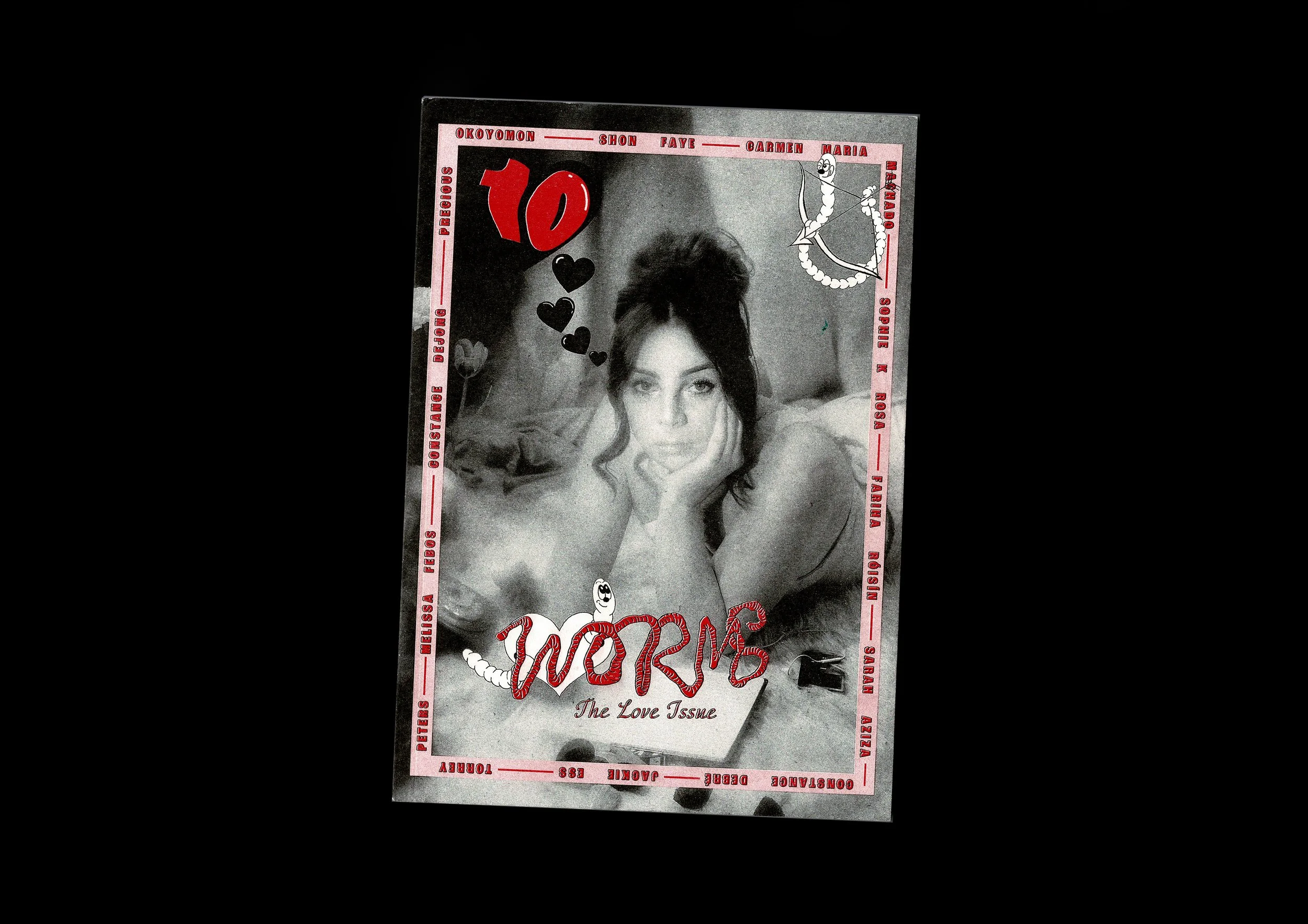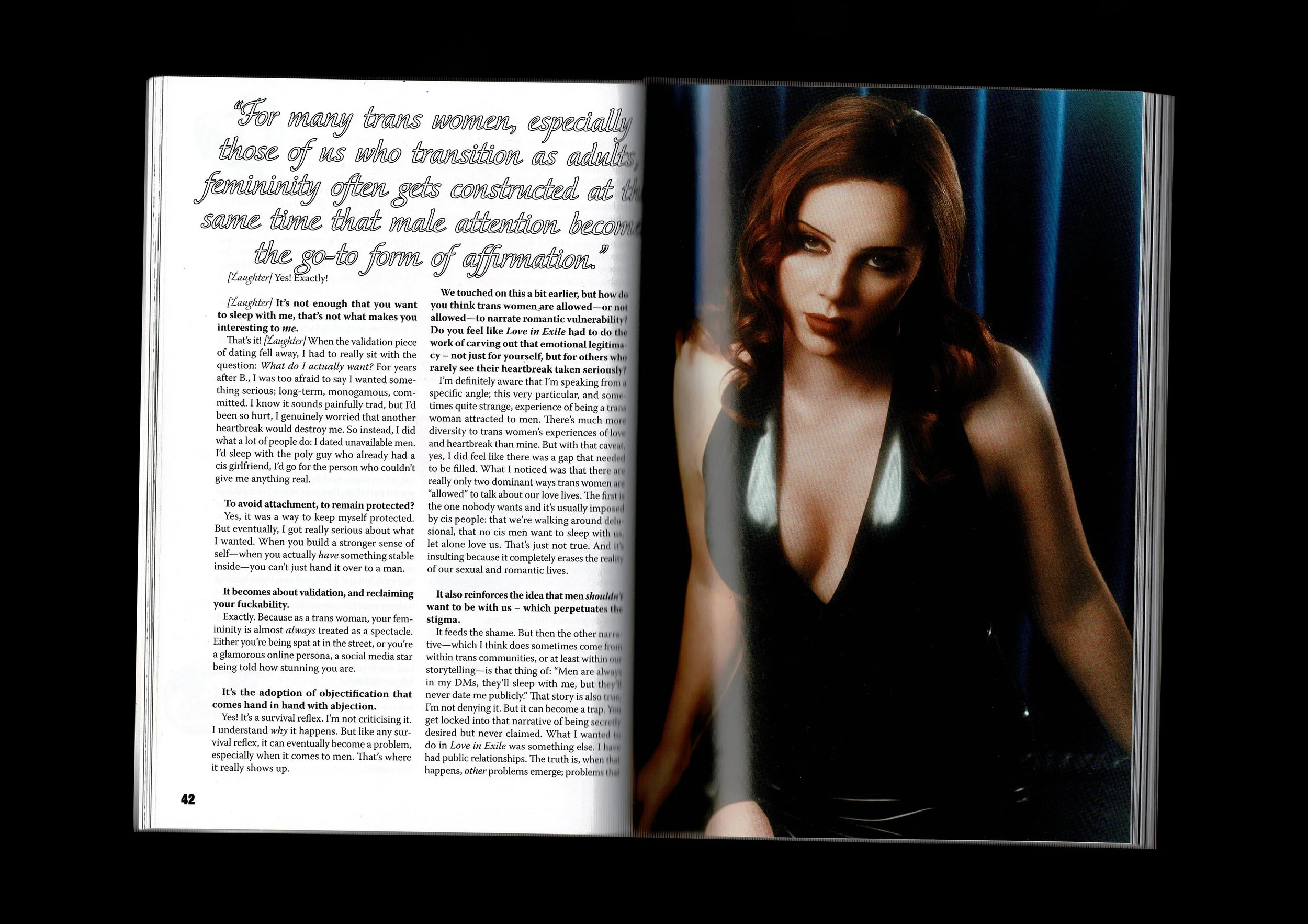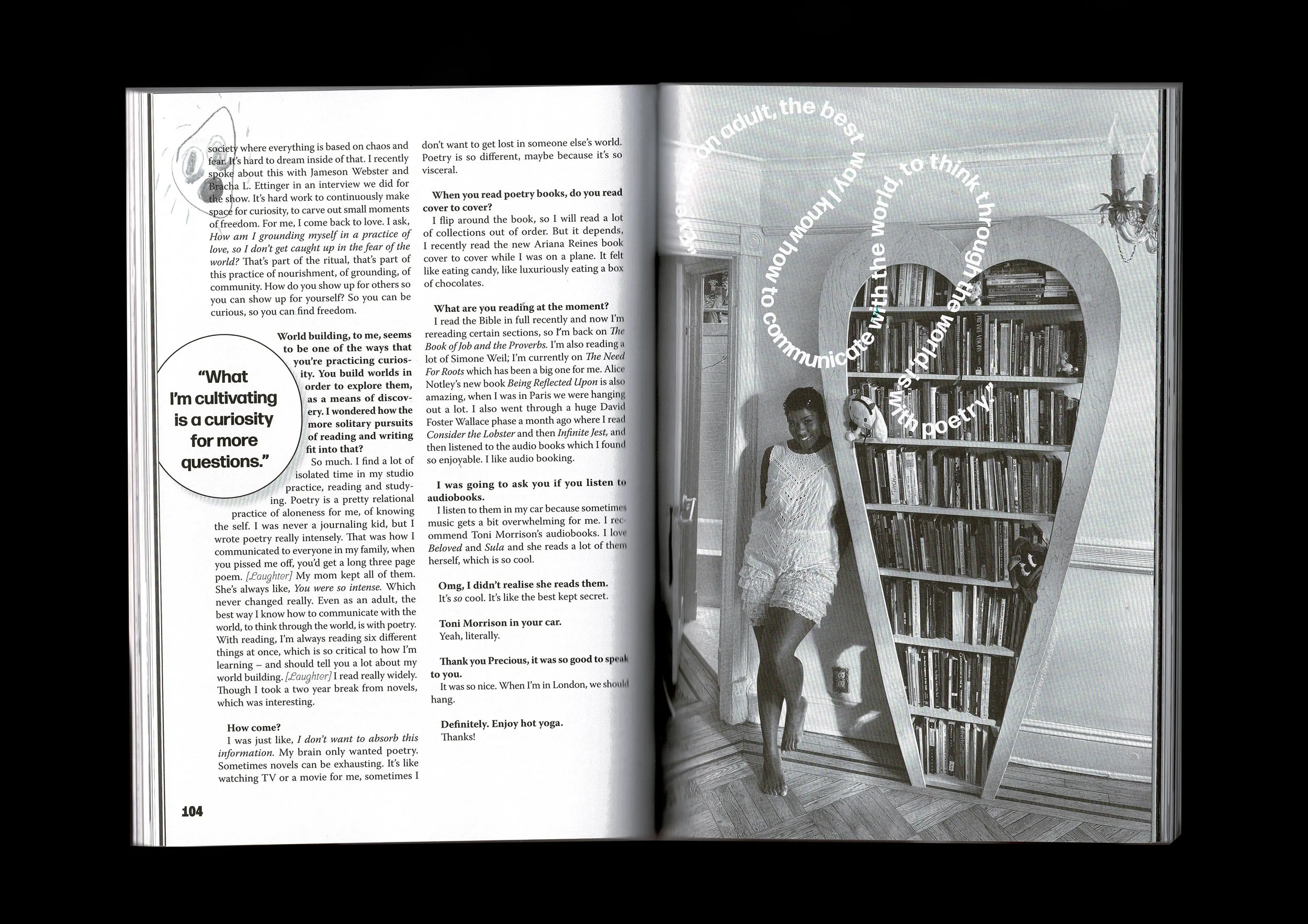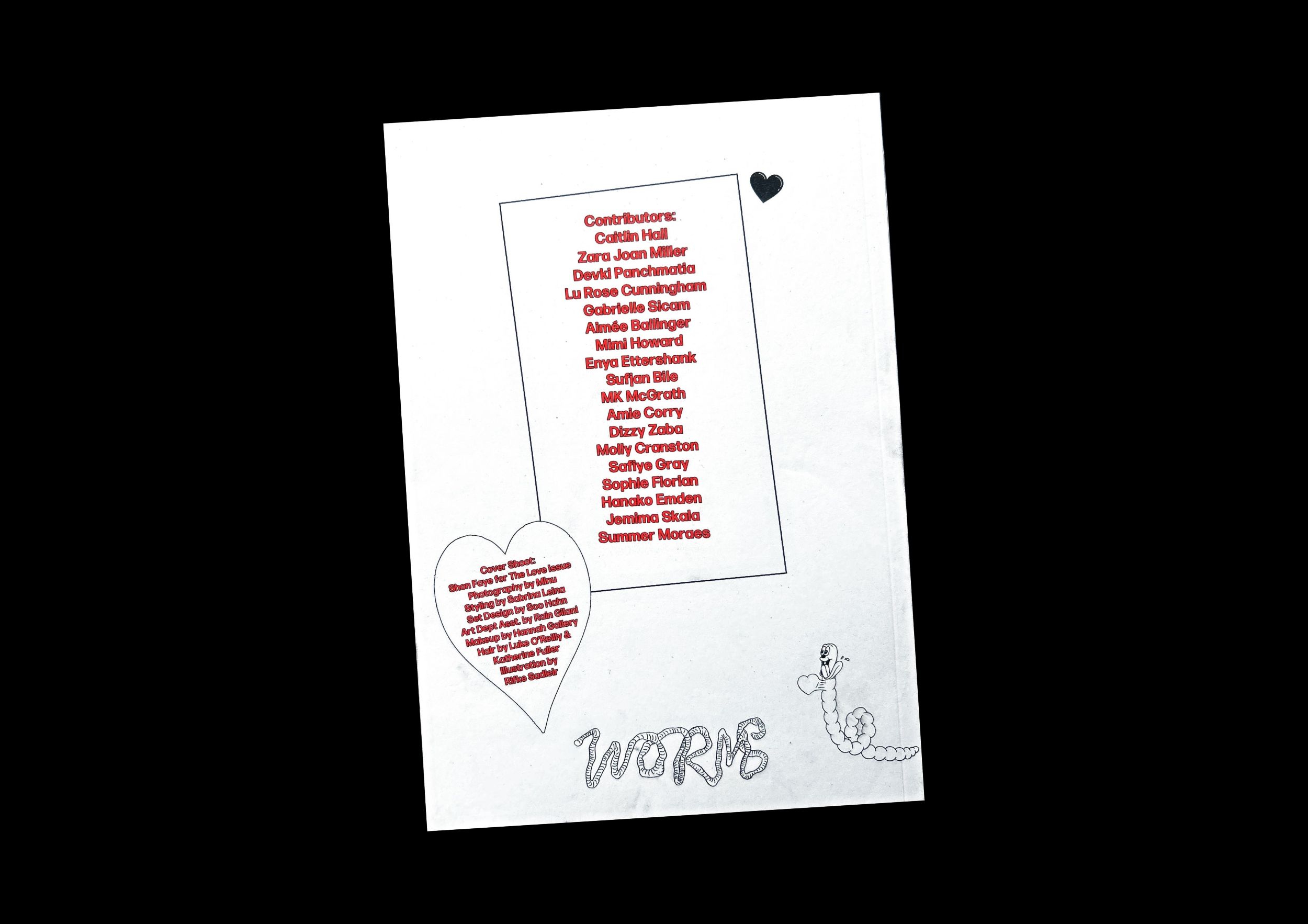Worms 10: The Editor’s Letter
by Caitlin McLoughlin
Dearest fertilisers,
Welcome to The Love Issue.
Last time I wrote one of these, it was hard to imagine how things could possibly get worse. And yet, here we are. Israel’s genocide against Palestine rages on in Gaza, and nine months into Trump’s presidency he’s wasted no time stripping the rights of trans people and immigrants, stoking the flames of bigotry and hatred. Here in the UK, it was the same day of our cover shoot with Shon Faye that the UK Supreme Court handed down its judgement that ‘biological sex’—as if that were something stable, reliable, objective—defines the ‘legal’ definition of ‘man’ or ‘woman,’ marking a devastating and somber milestone in the dissolution of trans rights. The nauseating fervour with which TERFs and bigots alike celebrated in its wake should tell you all you need to know about the true nature of this ruling, dressed in all its bureaucratic finery. This is state-sanctioned transphobia and the implications for trans people—legally, materially, medically, physically, spiritually—are nothing short of dire.
Faye’s book Love in Exile was part of the inspiration for this issue. Here, in conversation with P. Eldridge, she reflects on the ruling and the book's release. But Love in Exile goes far beyond the defiant cry for the basic rights and dignities trans people are unequivocally entitled to, it’s a deeply personal and resonant exploration of what it means to love and be loved within a system that excludes you from what is presented as universal. As she explains in the interview, she began from the place that “love is something we all deserve, and yet some of us experience a kind of banishment from it; from accessing it in its full, socially recognised form.” Trans people need access to medical care, to public toilets, a life safe from violence and transphobia, yes. But love, devotion, beauty—in all their myriad forms—are equally essential facets of a full and fulfilled life. Bread, and roses, too.
Later, also in conversation with P., Torrey Peters diagnoses the political fixation on trans people as a reaction to the threat posed by the radically new ways of living, of loving, of thinking, and of art making that trans people are continually at the forefront of. It is in her work as a writer—as a novelist—that she weaves together these notions through characters and narratives that grapple with struggles and anxieties familiar to us all. “Just the stuff of life,” as Jackie Ess tells me, “or of novels, which are like life, but better.” It follows that it is often trans art, trans writing, that has the language for the tensions and complexities of experiences that are in fact universal – gender performance, bodily autonomy, the power of community, the messiness of love. If this issue of Worms stands for anything, it is a testament to the unwavering resilience and boundless creativity of trans writers. Bread and roses, bread and roses.
Other things have emerged again and again in our foray into the folds of love and literature. The pervasiveness of heterosexual scripts, the contradictions of masculinity, the refuge and clarity found in spirituality, the enduring power of friendship; and, perhaps more surprisingly, words like rigour, discipline, integrity, truth. In my conversation with Melissa Febos we arrive at the practice of integrity as the centrifugal force that guides the best and most fulfilling kinds of love, and of writing: “I think the ways that they’re similar for me is that the definition of integrity and truthfulness that I arrived at in love is one that is defined by an authentic understanding of who I am.” Gabrielle Sicam touches on something similar in her essay that delves into the ethics and challenges of telling love stories that are not just our own – she asks, what new modes of narration might we find to capture love's expanse?
It’s hard to know if love is something simple that we overcomplicate, or something so complicated that we can’t even begin to scratch at its glossy surface. But, as Constance Debré tells Arcadia Molinas, “Love is not just this pink and sweet thing.” It can be harmful, something violent, demanding. In this issue we ask questions like: How can we continue to love someone who refuses to change? Is writing about sex still strange – or have we done and seen it all? What do you do if you fall in love with your sperm donor? Clem MacLeod talks to author Constance DeJong about her iconic 1977 novel Modern Love. With Jemima Skala, Sophie K Rosa contemplates the challenges of addressing limited and limiting forms of intimacy. I ask artist and poet Precious Okoyomon about their understanding of love as something grounding, something nourishing. Pet love, age-gap relationships, the guts and gristle of motherhood, getting off on poetry. It’s all here.
In conversation with Fariha Róisín, Palestinian-American writer Sarah Aziza describes how she resists the rules of Western craft, and of recovery narratives which “too often offer artificial conclusions.” Instead, she favours a commitment to writing in the spirit of ongoing and relentless resistance – love and refusal. In a moment so saturated with grief, terror, and helpless rage, it’s easy to feel that love—like art—can’t possibly be enough. What does it mean to write about love when homes are flattened and bodies are buried under rubble. Aziza reckons with this very question, how and why we write when we know that words fail. But it’s love that brings her back to the page, “I had to work even harder to focus, with love, on each sentence.” Love is not a retreat from reality – it is one of the last, most radical ways we insist on life. To love in this moment is to witness, to grieve, to resist, to hold fast to tenderness when the world would rather you harden. It may not fix what is broken, but it keeps us from breaking entirely. The epigraph of her memoir shares its title with the piece: “For Gaza, for love, words fail.”
Welcome to Worms 10: The Love Issue. We’re so back, baby. And this time, it’s love that has us in its tender clutches.
Worms Editors: Clem MacLeod, Caitlin McLoughlin, P. Eldridge & Arcadia Molinas








